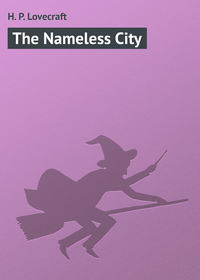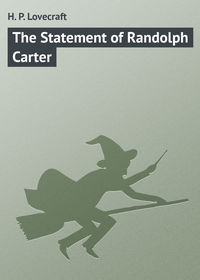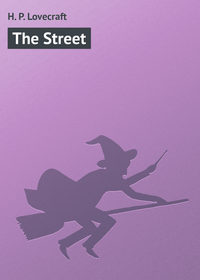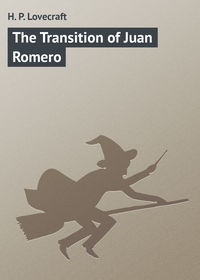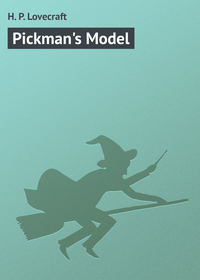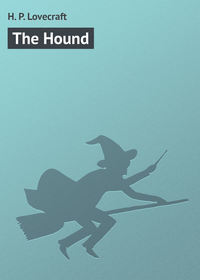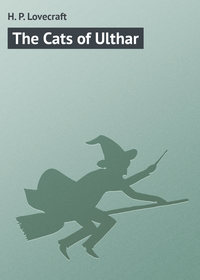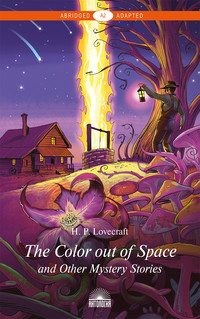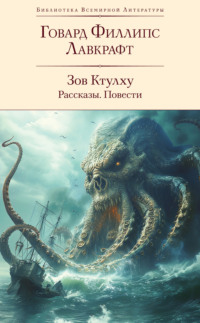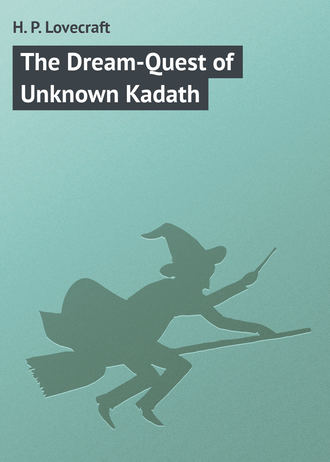
Полная версия
The Dream-Quest of Unknown Kadath
Then the black galley slipped into the harbour past the basalt wale and the tall lighthouse, silent and alien, and with a strange stench that the south wind drove into the town. Uneasiness rustled through the taverns along that waterfront, and after a while the dark wide – mouthed merchants with humped turbans and short feet clumped steathily ashore to seek the bazaars of the jewellers. Carter observed them closely, and disliked them more the longer he looked at them. Then he saw them drive the stout black men of Parg up the gangplank grunting and sweating into that singular galley, and wondered in what lands – or if in any lands at all – those fat pathetic creatures might be destined to serve.
And on the third evening of that galley’s stay one of the uncomfortable merchants spoke to him, smirking sinfully and hinting of what he had heard in the taverns of Carter’s quest. He appeared to have knowledge too secret for public telling; and although the sound of his voice was unbearably hateful, Carter felt that the lore of so far a traveller must not be overlooked. He bade him therefore be his guest in locked chambers above, and drew out the last of the Zoogs’ moon-wine to loosen his tongue. The strange merchant drank heavily, but smirked unchanged by the draught. Then he drew forth a curious bottle with wine of his own, and Carter saw that the bottle was a single hollowed ruby, grotesquely carved in patterns too fabulous to be comprehended. He offered his wine to his host, and though Carter took only the least sip, he felt the dizziness of space and the fever of unimagined jungles. All the while the guest had been smiling more and more broadly, and as Carter slipped into blankness the last thing he saw was that dark odious face convulsed with evil laughter and something quite unspeakable where one of the two frontal puffs of that orange turban had become disarranged with the shakings of that epileptic mirth.
Carter next had consciousness amidst horrible odours beneath a tent – like awning on the deck of a ship, with the marvellous coasts of the Southern Sea flying by in unnatural swiftness. He was not chained, but three of the dark sardonic merchants stood grinning nearby, and the sight of those humps in their turbans made him almost as faint as did the stench that filtered up through the sinister hatches. He saw slip past him the glorious lands and cities of which a fellow-dreamer of earth – a lighthouse-keeper in ancient Kingsport – had often discoursed in the old days, and recognized the templed terraces of Zak, abode of forgotten dreams; the spires of infamous Thalarion, that daemon-city of a thousand wonders where the eidolon Lathi reigns; the charnel gardens of Zura, land of pleasures unattained, and the twin headlands of crystal, meeting above in a resplendent arch, which guard the harbour of Sona-Nyl, blessed land of fancy.
Past all these gorgeous lands the malodourous ship flew unwholesomely, urged by the abnormal strokes of those unseen rowers below. And before the day was done Carter saw that the steersman could have no other goal than the Basalt Pillars of the West, beyond which simple folk say splendid Cathuria lies, but which wise dreamers well know are the gates of a monstrous cataract wherein the oceans of earth’s dreamland drop wholly to abysmal nothingness and shoot through the empty spaces toward other worlds and other stars and the awful voids outside the ordered universe where the daemon sultan Azathoth gnaws hungrily in chaos amid pounding and piping and the hellish dancing of the Other Gods, blind, voiceless, tenebrous, and mindless, with their soul and messenger Nyarlathotep.
Meanwhile the three sardonic merchants would give no word of their intent, though Carter well knew that they must be leagued with those who wished to hold him from his quest. It is understood in the land of dream that the Other Gods have many agents moving among men; and all these agents, whether wholly human or slightly less than human, are eager to work the will of those blind and mindless things in return for the favour of their hideous soul and messenger, the crawling chaos Nyarlathotep. So Carter inferred that the merchants of the humped turbans, hearing of his daring search for the Great Ones in their castle of Kadath, had decided to take him away and deliver him to Nyarlathotep for whatever nameless bounty might be offered for such a prize. What might be the land of those merchants in our known universe or in the eldritch spaces outside, Carter could not guess; nor could he imagine at what hellish trysting-place they would meet the crawling chaos to give him up and claim their reward. He knew, however, that no beings as nearly human as these would dare approach the ultimate nighted throne of the daemon Azathoth in the formless central void.
At the set of sun the merchants licked their excessively wide lips and glared hungrily and one of them went below and returned from some hidden and offensive cabin with a pot and basket of plates. Then they squatted close together beneath the awning and ate the smoking meat that was passed around. But when they gave Carter a portion, he found something very terrible in the size and shape of it; so that he turned even paler than before and cast that portion into the sea when no eye was on him. And again he thought of those unseen rowers beneath, and of the suspicious nourishment from which their far too mechanical strength was derived.
It was dark when the galley passed betwixt the Basalt Pillars of the West and the sound of the ultimate cataract swelled portentous from ahead. And the spray of that cataract rose to obscure the stars, and the deck grew damp, and the vessel reeled in the surging current of the brink. Then with a queer whistle and plunge the leap was taken, and Carter felt the terrors of nightmare as earth fell away and the great boat shot silent and comet-like into planetary space. Never before had he known what shapeless black things lurk and caper and flounder all through the aether, leering and grinning at such voyagers as may pass, and sometimes feeling about with slimy paws when some moving object excites their curiosity. These are the nameless larvae of the Other Gods, and like them are blind and without mind, and possessed of singular hungers and thirsts.
But that offensive galley did not aim as far as Carter had feared, for he soon saw that the helmsman was steering a course directly for the moon. The moon was a crescent shining larger and larger as they approached it, and shewing its singular craters and peaks uncomfortably. The ship made for the edge, and it soon became clear that its destination was that secret and mysterious side which is always turned away from earth, and which no fully human person, save perhaps the dreamer Snireth-Ko, has ever beheld. The close aspect of the moon as the galley drew near proved very disturbing to Carter, and he did not like the size and shape of the ruins which crumbled here and there. The dead temples on the mountains were so placed that they could have glorified no suitable or wholesome gods, and in the symmetries of the broken columns there seemed to be some dark and inner meaning which did not invite solution. And what the structure and proportions of the olden worshippers could have been, Carter steadily refused to conjecture.
When the ship rounded the edge, and sailed over those lands unseen by man, there appeared in the queer landscape certain signs of life, and Carter saw many low, broad, round cottages in fields of grotesque whitish fungi. He noticed that these cottages had no windows, and thought that their shape suggested the huts of Esquimaux. Then he glimpsed the oily waves of a sluggish sea, and knew that the voyage was once more to be by water – or at least through some liquid. The galley struck the surface with a peculiar sound, and the odd elastic way the waves received it was very perplexing to Carter.
They now slid along at great speed, once passing and hailing another galley of kindred form, but generally seeing nothing but that curious sea and a sky that was black and star-strewn even though the sun shone scorchingly in it.
There presently rose ahead the jagged hills of a leprous-looking coast, and Carter saw the thick unpleasant grey towers of a city. The way they leaned and bent, the manner in which they were clustered, and the fact that they had no windows at all, was very disturbing to the prisoner; and he bitterly mourned the folly which had made him sip the curious wine of that merchant with the humped turban. As the coast drew nearer, and the hideous stench of that city grew stronger, he saw upon the jagged hills many forests, some of whose trees he recognized as akin to that solitary moon-tree in the enchanted wood of earth, from whose sap the small brown Zoogs ferment their curious wine.
Carter could now distinguish moving figures on the noisome wharves ahead, and the better he saw them the worse he began to fear and detest them. For they were not men at all, or even approximately men, but great greyish-white slippery things which could expand and contract at will, and whose principal shape – though it often changed – was that of a sort of toad without any eyes, but with a curious vibrating mass of short pink tentacles on the end of its blunt, vague snout. These objects were waddling busily about the wharves, moving bales and crates and boxes with preternatural strength, and now and then hopping on or off some anchored galley with long oars in their forepaws. And now and then one would appear driving a herd of clumping slaves, which indeed were approximate human beings with wide mouths like those merchants who traded in Dylath-Leen; only these herds, being without turbans or shoes or clothing, did not seem so very human after all. Some of the slaves – the fatter ones, whom a sort of overseer would pinch experimentally – were unloaded from ships and nailed in crates which workers pushed into the low warehouses or loaded on great lumbering vans.
Once a van was hitched and driven off, and the fabulous thing which drew it was such that Carter gasped, even after having seen the other monstrosities of that hateful place. Now and then a small herd of slaves dressed and turbaned like the dark merchants would be driven aboard a galley, followed by a great crew of the slippery toad-things as officers, navigators, and rowers. And Carter saw that the almost – human creatures were reserved for the more ignominious kinds of servitude which required no strength, such as steering and cooking, fetching and carrying, and bargaining with men on the earth or other planets where they traded. These creatures must have been convenient on earth, for they were truly not unlike men when dressed and carefully shod and turbaned, and could haggle in the shops of men without embarrassment or curious explanations. But most of them, unless lean or ill-favoured, were unclothed and packed in crates and drawn off in lumbering lorries by fabulous things. Occasionally other beings were unloaded and crated; some very like these semi-humans, some not so similar, and some not similar at all. And he wondered if any of the poor stout black men of Parg were left to be unloaded and crated and shipped inland in those obnoxious drays.
When the galley landed at a greasy-looking quay of spongy rock a nightmare horde of toad-things wiggled out of the hatches, and two of them seized Carter and dragged him ashore. The smell and aspect of that city are beyond telling, and Carter held only scattered images of the tiled streets and black doorways and endless precipices of grey vertical walls without windows. At length he was dragged within a low doorway and made to climb infinite steps in pitch blackness. It was, apparently, all one to the toad-things whether it were light or dark. The odour of the place was intolerable, and when Carter was locked into a chamber and left alone he scarcely had strength to crawl around and ascertain its form and dimensions. It was circular, and about twenty feet across.
From then on time ceased to exist. At intervals food was pushed in, but Carter would not touch it. What his fate would be, he did not know; but he felt that he was held for the coming of that frightful soul and messenger of infinity’s Other Gods, the crawling chaos Nyarlathotep. Finally, after an unguessed span of hours or days, the great stone door swung wide again, and Carter was shoved down the stairs and out into the red-litten streets of that fearsome city. It was night on the moon, and all through the town were stationed slaves bearing torches.
In a detestable square a sort of procession was formed; ten of the toad-things and twenty-four almost human torch-bearers, eleven on either side, and one each before and behind. Carter was placed in the middle of the line; five toad-things ahead and five behind, and one almost-human torch-bearer on either side of him. Certain of the toad-things produced disgustingly carven flutes of ivory and made loathsome sounds. To that hellish piping the column advanced out of the tiled streets and into nighted plains of obscene fungi, soon commencing to climb one of the lower and more gradual hills that lay behind the city. That on some frightful slope or blasphemous plateau the crawling chaos waited, Carter could not doubt; and he wished that the suspense might soon be over. The whining of those impious flutes was shocking, and he would have given worlds for some even half-normal sound; but these toad-things had no voices, and the slaves did not talk.
Then through that star-specked darkness there did come a normal sound. It rolled from the higher hills, and from all the jagged peaks around it was caught up and echoed in a swelling pandaemoniac chorus. It was the midnight yell of the cat, and Carter knew at last that the old village folk were right when they made low guesses about the cryptical realms which are known only to cats, and to which the elders among cats repair by stealth nocturnally, springing from high housetops. Verily, it is to the moon’s dark side that they go to leap and gambol on the hills and converse with ancient shadows, and here amidst that column of foetid things Carter heard their homely, friendly cry, and thought of the steep roofs and warm hearths and little lighted windows of home.
Now much of the speech of cats was known to Randolph Carter, and in this far terrible place he uttered the cry that was suitable. But that he need not have done, for even as his lips opened he heard the chorus wax and draw nearer, and saw swift shadows against the stars as small graceful shapes leaped from hill to hill in gathering legions. The call of the clan had been given, and before the foul procession had time even to be frightened a cloud of smothering fur and a phalanx of murderous claws were tidally and tempestuously upon it. The flutes stopped, and there were shrieks in the night. Dying almost-humans screamed, and cats spit and yowled and roared, but the toad-things made never a sound as their stinking green ichor oozed fatally upon that porous earth with the obscene fungi.
It was a stupendous sight while the torches lasted, and Carter had never before seen so many cats. Black, grey, and white; yellow, tiger, and mixed; common, Persian, and Marix; Thibetan, Angora, and Egyptian; all were there in the fury of battle, and there hovered over them some trace of that profound and inviolate sanctity which made their goddess great in the temples of Bubastis. They would leap seven strong at the throat of an almost-human or the pink tentacled snout of a toad-thing and drag it down savagely to the fungous plain, where myriads of their fellows would surge over it and into it with the frenzied claws and teeth of a divine battle-fury. Carter had seized a torch from a stricken slave, but was soon overborne by the surging waves of his loyal defenders. Then he lay in the utter blackness hearing the clangour of war and the shouts of the victors, and feeling the soft paws of his friends as they rushed to and fro over him in the fray.
At last awe and exhaustion closed his eyes, and when he opened them again it was upon a strange scene. The great shining disc of the earth, thirteen times greater than that of the moon as we see it, had risen with floods of weird light over the lunar landscape; and across all those leagues of wild plateau and ragged crest there squatted one endless sea of cats in orderly array. Circle on circle they reached, and two or three leaders out of the ranks were licking his face and purring to him consolingly. Of the dead slaves and toad-things there were not many signs, but Carter thought he saw one bone a little way off in the open space between him and the warriors.
Carter now spoke with the leaders in the soft language of cats, and learned that his ancient friendship with the species was well known and often spoken of in the places where cats congregate. He had not been unmarked in Ulthar when he passed through, and the sleek old cats had remembered how he patted them after they had attended to the hungry Zoogs who looked evilly at a small black kitten. And they recalled, too, how he had welcomed the very little kitten who came to see him at the inn, and how he had given it a saucer of rich cream in the morning before he left. The grandfather of that very little kitten was the leader of the army now assembled, for he had seen the evil procession from a far hill and recognized the prisoner as a sworn friend of his kind on earth and in the land of dream.
A yowl now came from the farther peak, and the old leader paused abruptly in his conversation. It was one of the army’s outposts, stationed on the highest of the mountains to watch the one foe which Earth’s cats fear; the very large and peculiar cats from Saturn, who for some reason have not been oblivious of the charm of our moon’s dark side. They are leagued by treaty with the evil toad-things, and are notoriously hostile to our earthly cats; so that at this juncture a meeting would have been a somewhat grave matter.
After a brief consultation of generals, the cats rose and assumed a closer formation, crowding protectingly around Carter and preparing to take the great leap through space back to the housetops of our earth and its dreamland. The old field-marshal advised Carter to let himself be borne along smoothly and passively in the massed ranks of furry leapers, and told him how to spring when the rest sprang and land gracefully when the rest landed. He also offered to deposit him in any spot he desired, and Carter decided on the city of Dylath-Leen whence the black galley had set out; for he wished to sail thence for Oriab and the carven crest Ngranek, and also to warn the people of the city to have no more traffick with black galleys, if indeed that traffick could be tactfully and judiciously broken off. Then, upon a signal, the cats all leaped gracefully with their friend packed securely in their midst; while in a black cave on an unhallowed summit of the moon-mountains still vainly waited the crawling chaos Nyarlathotep.
The leap of the cats through space was very swift; and being surrounded by his companions Carter did not see this time the great black shapelessnesses that lurk and caper and flounder in the abyss. Before he fully realised what had happened he was back in his familiar room at the inn at Dylath-Leen, and the stealthy, friendly cats were pouring out of the window in streams. The old leader from Ulthar was the last to leave, and as Carter shook his paw he said he would be able to get home by cockcrow. When dawn came, Carter went downstairs and learned that a week had elapsed since his capture and leaving. There was still nearly a fortnight to wait for the ship bound toward Oriab, and during that time he said what he could against the black galleys and their infamous ways. Most of the townsfolk believed him; yet so fond were the jewellers of great rubies that none would wholly promise to cease trafficking with the wide-mouthed merchants. If aught of evil ever befalls Dylath-Leen through such traffick, it will not be his fault.
In about a week the desiderate ship put in by the black wale and tall lighthouse, and Carter was glad to see that she was a barque of wholesome men, with painted sides and yellow lateen sails and a grey captain in silken robes. Her cargo was the fragrant resin of Oriab’s inner groves, and the delicate pottery baked by the artists of Baharna, and the strange little figures carved from Ngranek’s ancient lava. For this they were paid in the wool of Ulthar and the iridescent textiles of Hatheg and the ivory that the black men carve across the river in Parg. Carter made arrangements with the captain to go to Baharna and was told that the voyage would take ten days. And during his week of waiting he talked much with that captain of Ngranek, and was told that very few had seen the carven face thereon; but that most travellers are content to learn its legends from old people and lava – gatherers and image-makers in Baharna and afterward say in their far homes that they have indeed beheld it. The captain was not even sure that any person now living had beheld that carven face, for the wrong side of Ngranek is very difficult and barren and sinister, and there are rumours of caves near the peak wherein dwell the night-gaunts. But the captain did not wish to say just what a night-gaunt might be like, since such cattle are known to haunt most persistently the dreams of those who think too often of them. Then Carter asked that captain about unknown Kadath in the cold waste, and the marvellous sunset city, but of these the good man could truly tell nothing.
Carter sailed out of Dylath-Leen one early morning when the tide turned, and saw the first rays of sunrise on the thin angular towers of that dismal basalt town. And for two days they sailed eastward in sight of green coasts, and saw often the pleasant fishing towns that climbed up steeply with their red roofs and chimney-pots from old dreaming wharves and beaches where nets lay drying. But on the third day they turned sharply south where the roll of water was stronger, and soon passed from sight of any land. On the fifth day the sailors were nervous, but the captain apologized for their fears, saying that the ship was about to pass over the weedy walls and broken columns of a sunken city too old for memory, and that when the water was clear one could see so many moving shadows in that deep place that simple folk disliked it. He admitted, moreover, that many ships had been lost in that part of the sea; having been hailed when quite close to it, but never seen again.
That night the moon was very bright, and one could see a great way down in the water. There was so little wind that the ship could not move much, and the ocean was very calm. Looking over the rail Carter saw many fathoms deep the dome of the great temple, and in front of it an avenue of unnatural sphinxes leading to what was once a public square. Dolphins sported merrily in and out of the ruins, and porpoises revelled clumsily here and there, sometimes coming to the surface and leaping clear out of the sea. As the ship drifted on a little the floor of the ocean rose in hills, and one could clearly mark the lines of ancient climbing streets and the washed-down walls of myriad little houses.
Then the suburbs appeared, and finally a great lone building on a hill, of simpler architecture than the other structures, and in much better repair. It was dark and low and covered four sides of a square, with a tower at each corner, a paved court in the centre, and small curious round windows all over it. Probably it was of basalt, though weeds draped the greater part; and such was its lonely and impressive place on that far hill that it may have been a temple or a monastery. Some phosphorescent fish inside it gave the small round windows an aspect of shining, and Carter did not blame the sailors much for their fears. Then by the watery moonlight he noticed an odd high monolith in the middle of that central court, and saw that something was tied to it. And when after getting a telescope from the captain’s cabin he saw that that bound thing was a sailor in the silk robes of Oriab, head downward and without any eyes, he was glad that a rising breeze soon took the ship ahead to more healthy parts of the sea.
The next day they spoke with a ship with violet sails bound for Zar, in the land of forgotten dreams, with bulbs of strange coloured lilies for cargo. And on the evening of the eleventh day they came in sight of the isle of Oriab with Ngranek rising jagged and snow-crowned in the distance. Oriab is a very great isle, and its port of Baharna a mighty city. The wharves of Baharna are of porphyry, and the city rises in great stone terraces behind them, having streets of steps that are frequently arched over by buildings and the bridges between buildings. There is a great canal which goes under the whole city in a tunnel with granite gates and leads to the inland lake of Yath, on whose farther shore are the vast clay-brick ruins of a primal city whose name is not remembered. As the ship drew into the harbour at evening the twin beacons Thon and Thal gleamed a welcome, and in all the million windows of Baharna’s terraces mellow lights peeped out quietly and gradually as the stars peep out overhead in the dusk, till that steep and climbing seaport became a glittering constellation hung between the stars of heaven and the reflections of those stars in the still harbour.




